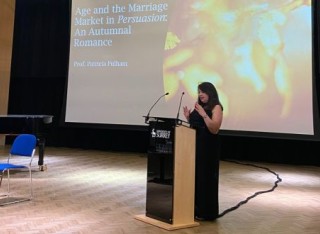
Darren Tunstall
About
Biography
Darren read English at Cambridge University before training at the Bristol Old Vic Theatre School, then later with Philippe Gaulier, David Glass and Theatre de Complicite. He has been an actor, writer, director and dramaturg since 1988, and was a significant figure in the 'physical theatre' revolution of the 1990s, devising, performing and directing award-winning shows with companies like The Right Size, Told by an Idiot, Scarlet Theatre and Peepolykus. He was a company member, movement director and associate director for the Royal Shakespeare Company, and has worked for almost every major theatre production house in the UK, as well as for the BBC, ITV and Film Four. He has taught at the University of Central Lancashire, Central School of Speech and Drama, Arts Educational Schools and the British American Dramatic Academy.
ResearchResearch interests
Darren Tunstall's main research areas are Shakespeare, actor training and cognitive psychology, especially in relation to embodiment. He is currently engaged with colleagues in Psychology and Clinical Biomechanics on a major research project funded by the Royal Society/APEX fund on Developmental Coordination Disorder in adults, a topic on which he spoke at the Surrey TEDx event in 2021. He is a member of the International Network for Cognition, Theatre and Performance, and has presented at many conferences including for the British Shakespeare Association, the Shakespeare Association of America, the European Shakespeare Research Association and the Theatre and Performance Research Association.
Research interests
Darren Tunstall's main research areas are Shakespeare, actor training and cognitive psychology, especially in relation to embodiment. He is currently engaged with colleagues in Psychology and Clinical Biomechanics on a major research project funded by the Royal Society/APEX fund on Developmental Coordination Disorder in adults, a topic on which he spoke at the Surrey TEDx event in 2021. He is a member of the International Network for Cognition, Theatre and Performance, and has presented at many conferences including for the British Shakespeare Association, the Shakespeare Association of America, the European Shakespeare Research Association and the Theatre and Performance Research Association.
Teaching
Darren teaches across a number of GSA programmes including Foundation Acting, BA Acting, BA Actor Musician, BA Applied and Contemporary Theatre, BA Musical Theatre, BA Theatre, MA Theatre and MA Stage and Production Management. He also supervises PhD students. He is Programme Leader for MA Acting.
Publications
This chapter will show how an actor who has been trained in what I will call “the Lecoq tradition” may approach the rehearsal of Shakespeare’s text. No one can legitimately claim to make statements that are true in all contexts for all actors who have come into contact with Lecoq’s work. It is possible, however, to argue for patterns of agenda, vocabulary and approach, and in trying to do so I will draw largely upon Ariane Mnouchkine’s production of Richard II (1981) for her company Théâtre du Soleil. In addition, I will refer to two productions of Shakespeare I directed, for which my approach was influenced by Lecoq’s ideas: A Midsummer Night’s Dream (2009) and Macbeth (2011), both at St Peter’s Arts Centre, Preston in the UK. I will also mention in passing two productions of Shakespeare plays by Theatre de Complicite for elements of supporting evidence.
This is the first study of gesture in Shakespeare, tackling not only those gestures declared in the text, but also drawing on recent scholarship on kinesics and gestural codes to shed new light on practice. Through theoretical and practical analysis of the role of gesture, Tunstall argues that it must be seen within a network of non-verbal acts.
Humans are highly social creatures who use others' movements to evaluate their social competencies. Smooth movement specifically signals an attractive, trustworthy or competent person. Those with Developmental Coordination Disorder (DCD), have peer relationship difficulties and lower sociometric preference scores. However, the relationship of perception of poor movement coordination to stereotyping has not been directly demonstrated. We aimed to describe typically developing individuals' social stereotyping of individuals with and without DCD from minimal visual cues. 3D motion capture tracked the movement of four ‘targets’ (two adult males with DCD and two male controls) in a variety of everyday scenarios. Kinematic footage of the target's movements was presented as a point-light-display to 319 typically developing adults who used The Rating Scale of Social Competence to report perceptions of the target's social competencies. Targets with DCD were rated as having significantly lower social competence (M = 3.37, SD = 0.93) than controls (M = 3.46, SD = 0.89) t(269) = −5.656; p
Additional publications
Darren has written book chapters for The Routledge Companion to Actors' Shakespeare, The Routledge Companion to Jacques Lecoq, The Routledge Companion to Theatre, Performance and Cognitive Science and Time and Performer Training (Routledge). He has written articles for Shakespeare Bulletin and Journal of Adaptation in Film and Performance. His monograph Shakespeare in Practice: Gesture was published by Palgrave Macmillan in 2016. Most recently he co-authored an article for Human Movement Science and wrote a chapter for The Routledge Companion to Vsevolod Meyerhold. He is also working on his next book.
